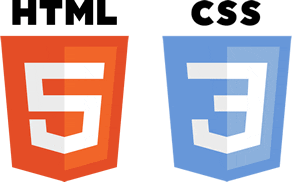What’s the difference between a regular link and a local link? Well, local links are links from local sources, typically, websites that are specific to a particular city. For example, a lawyer in Denver Colorado might have some local links from a local Denver newspaper, a local college, and a few other businesses within Denver.
Before we dive into local building strategies and tactics, let’s take a look at the two types of local results and discuss how local links help with the rankings in each.
1) Local Organic Results
Local organic results are the local websites listed within the organic results of a search query with local intent. For example, if you search for “denver lawyers”, you’ll see the websites of actual Denver lawyers in the results. The presence of “Denver” in the search term gives the query local intent. These are the local organic results.
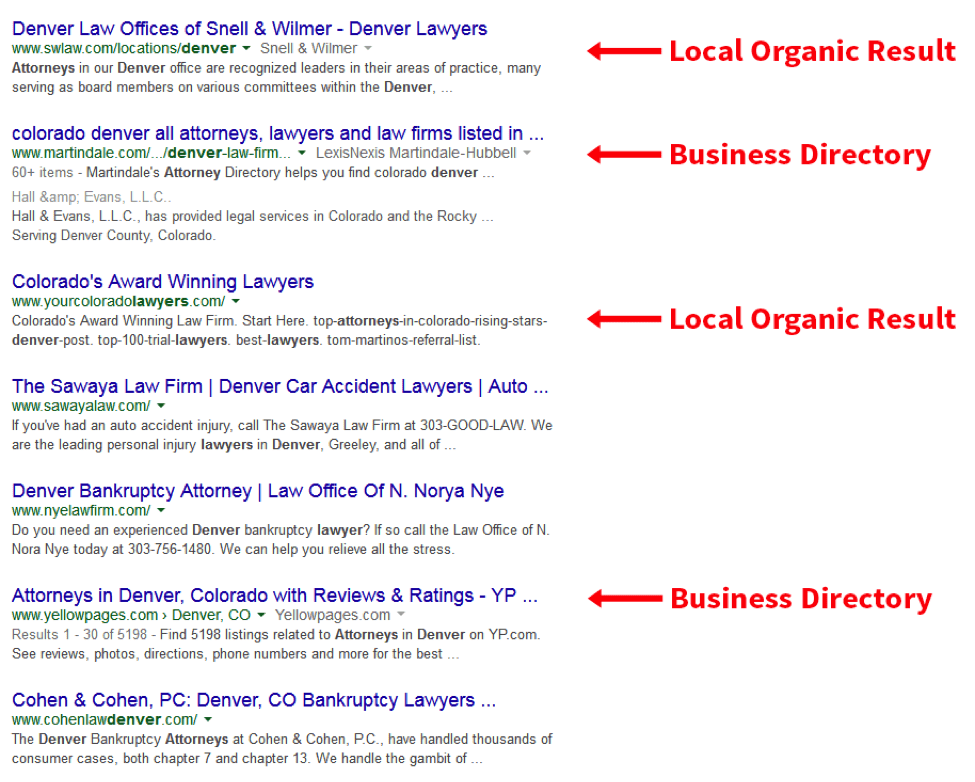
Local organic results are primarily driven by traditional web ranking signals, which are on-page signals and link signals, so local links are very valuable for increasing your rankings in these results.
2) Local Pack Results
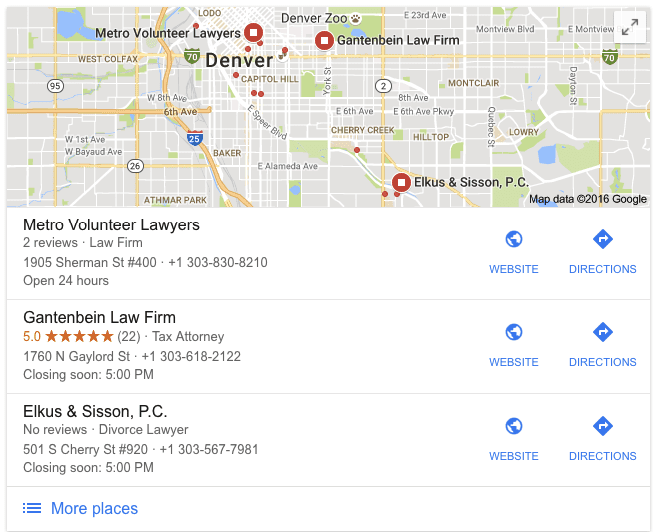
Local pack results appear for queries with sufficient local intent and where there is enough inventory of quality businesses in Google’s local database to fill a local pack. The number of results in the local pack will vary between 1 and 3 results. These results are driven by a combination of traditional web ranking signals (on-page and links), and local signals (citations, reviews, Google My Business listing).
In July 2014, Google released a major update to the local search algorithm called Pigeon that heavily impacted local results. There is now more emphasis on organic results and traditional web ranking signals, including on-page and link based factors. The dial was cranked on Domain Authority, and gaining quality local links has become one of the most important difference makers in competitive local search results like the example above.
One of the most challenging aspects of local link building is that often many small business websites aren’t very “linkable,” and many small business owners don’t have the budget to invest in exceptional content. You will see, however; based on the strategies outlined below that on the whole, small business websites can often be link worthy simply due to their local relevance. This gives them an edge over national brands that have more barriers in getting these local links.
The majority of small business websites have no links other than directory links, which ends up working in their favour, because simply acquiring a handful of quality local links can have a significant impact on their local rankings in less competitive local markets. David Mihm, one of local search’s foremost experts, has said that the typical small business has less than 4 non-spam, non-directory links:
So, with this in mind, let’s get into some strategies for acquiring those local links.
Local Link Building Strategies
For some of the strategies below, I’ll walk you through a specific example of how our fictitious business, Moogan & Shaw Law, located in Chicago IL, would research for and acquire these links. Of course, not all of these strategies will work for all businesses. For example, if you’re not hiring, you may not have a jobs page to build links to.
1) Citations
In the simplest of terms, a citation is a mention of your business’ name, address, and phone number (NAP) on any website. Although these mentions often include a link to your website, it’s typically the mention of the NAP info that passes value within the local search algorithm. Citations can be grouped into two categories:
Structured Citations
These are mentions on business listings sites like Yelp, Yellowpages.com, chicagobusinessdirectory.org, lawyerslistings.com, etc
Unstructured Citations
These are mentions of your business on any other site, like blogs, newspaper websites, event listings, job databases, government websites and so on.
Getting mentions and links from local blogs, newspaper sites, and other local business will be covered in the strategies below, so we’ll just be looking at structured citations in this section.
While citations without links are still valuable, this is a book about local link building, so we’re going to focus on citation building as a local link building tactic. Many of the links you get from business listing sites are nofollow links, but the relevancy signal they send and the ease of acquiring these links make them a no-brainer for establishing the baseline links for any local business.
You may be thinking that this is no different than directory link building, but there is a difference. Business listing sites are heavily crawled, indexed, and used by Google to build their local database. We see these sites appearing prominently for most local searches:
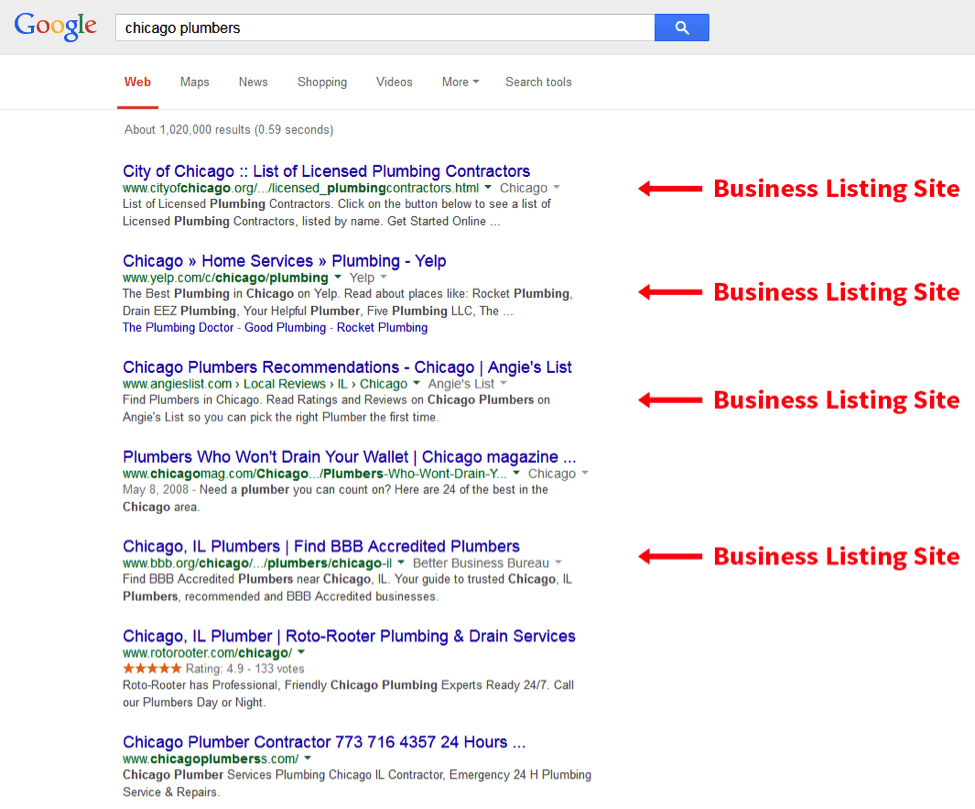
Being listed on these sites provides important industry specific relevancy signals, as well as important location signals, to Google.
As with any link building tactic, you have to be careful to not overdo it. There are diminishing returns from continued citation building. You’ll eventually reach a point where you’re already listed on the important quality sites, and additional citation building will provide no additional benefits. So how many citations are enough? I suggest sticking to the following general guidelines:
- Get listed on the top 50 to 80 general citation sites in your country.
- Get listed on the top 5 to 20 industry-specific sites in your industry.
- Get listed on the top 2 to 8 city-specific sites in your city.
The actual inventory of decent quality sites will vary depending on your country, industry, and city.
Ok, now that you have the background, let’s dive into finding and building these structured citations. The best place to start is with our lists of the most important citation sites in the US, Canada, UK, and Australia.
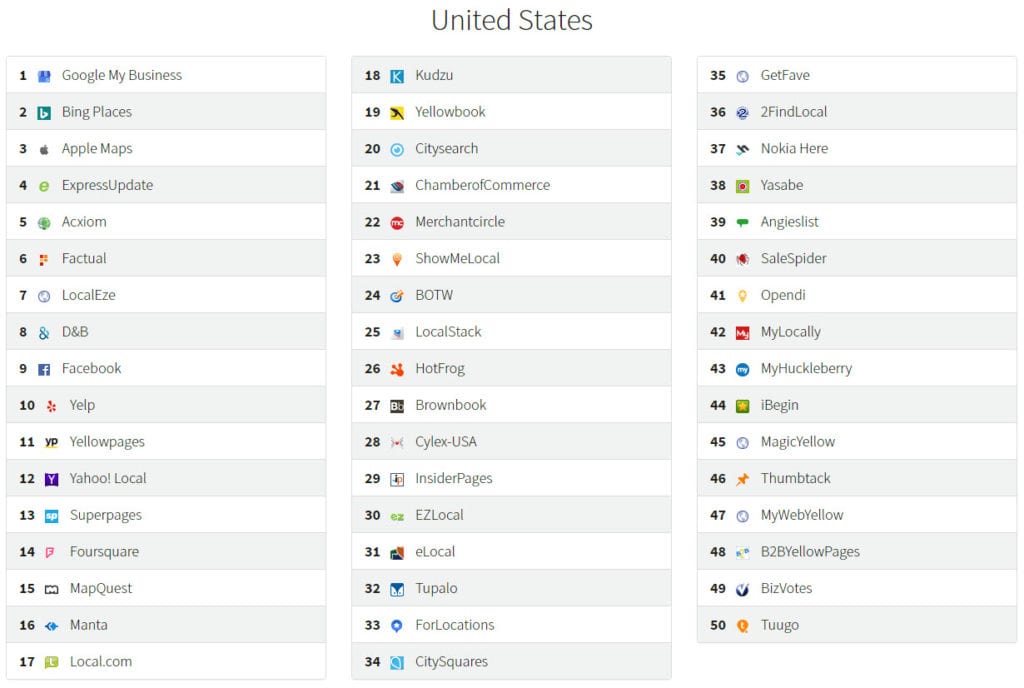
These carefully curated lists include the most important and most valuable general sites in the country. They are “general” in the sense that they list businesses from almost any industry and any city. You will want to make sure you have one (and only one), complete and accurate listing on each of these sites. They are ordered by priority, so start at #1 and work your way through the list.
Next, you’ll want to add the top citations your competitors have that you don’t. To find them, use the Local Citation Finder.
The Local Citation Finder will find all the top rankings business for your search term, and then let you compare their citations with yours to find the common citations that you’re missing. Here’s how to get this data:
1) Start by searching for your primary keyword in the city of the business (for this example it is Lawyers):
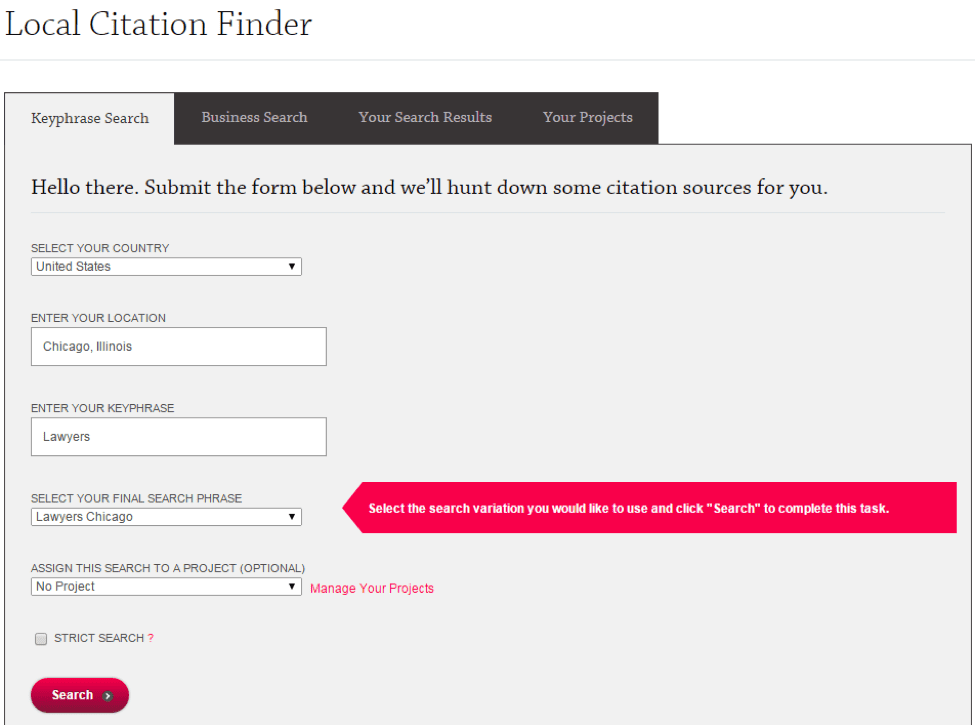
2) View the results for this search and add your business:

3) Now click the link to compare citations:

4) You’ll get a comparison chart showing you all the places your top ranked competitors are listed that you are not.
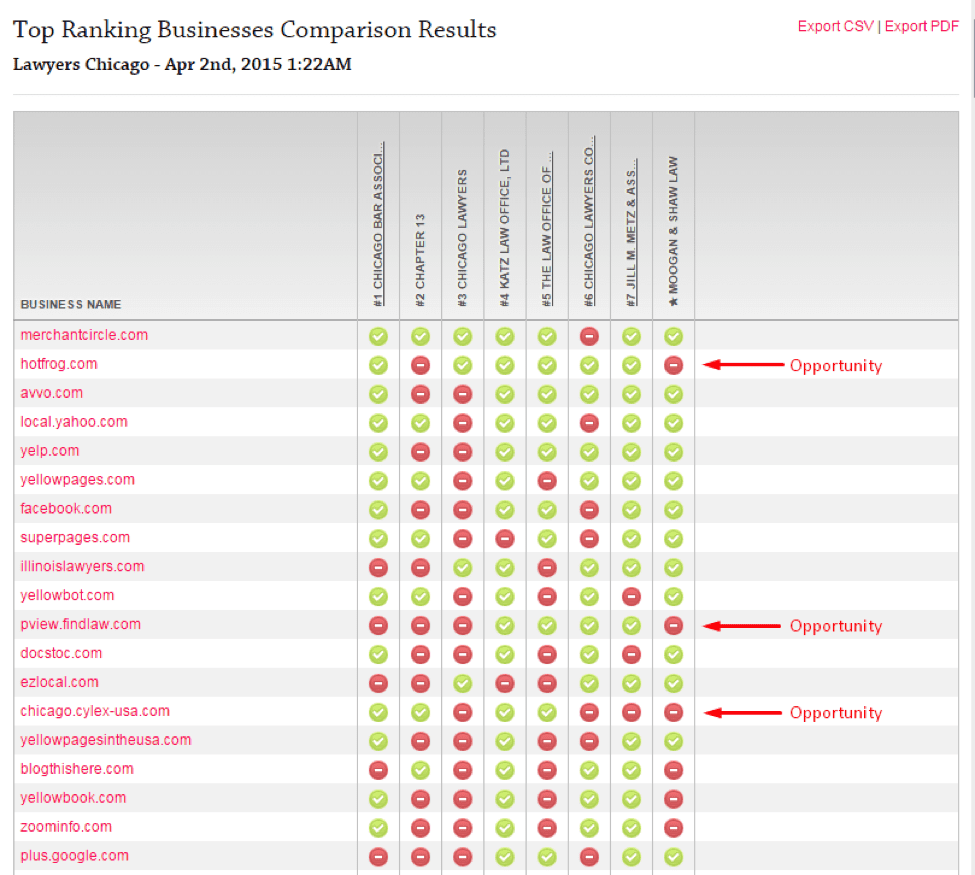
If the top ranked competition is listed on these sites, then you’ll want to be listed too.
Next, you’ll want to get listed on the important industry specific and city specific business listing sites for the business. Use Google to find them with these queries:
- (city) business listings
- (city) business directory
- (city) directory
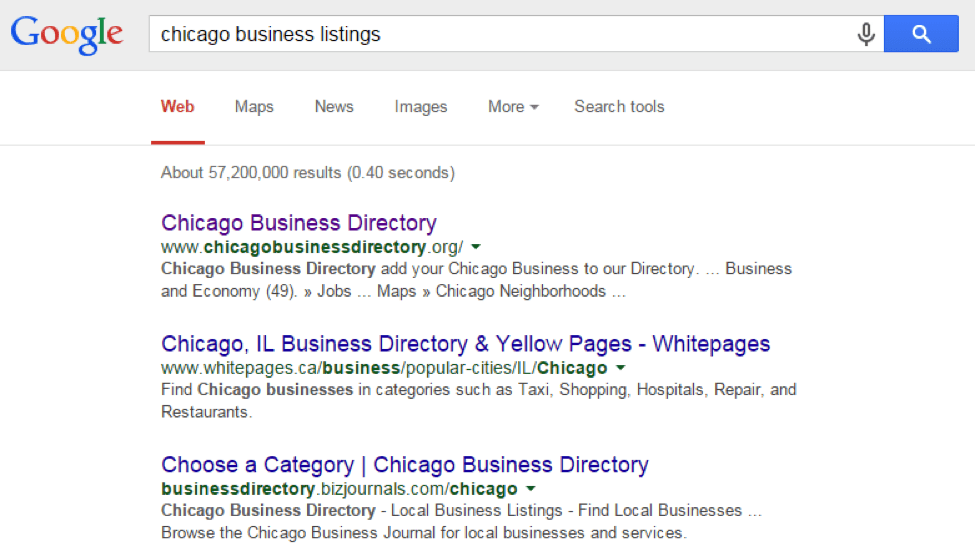
- (keyword) business listings
- (keyword) business directory
- (keyword) directory
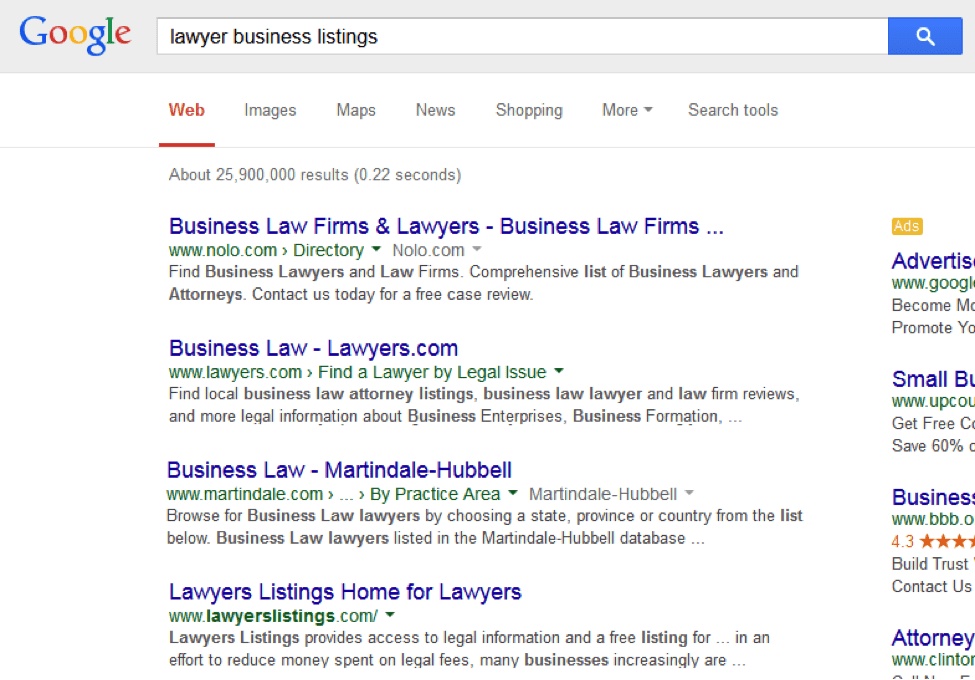
2) Business Associations
Links and citations from business associations in your industry are very valuable and very easy to get, assuming you can afford the membership fees. Almost every industry has at least one professional association at the city, state, or country level that you can join. These association links provide a perfect, trustworthy, relevancy signal that can give your local seo a decent boost. I’ve seen many businesses ranking with only business association links and nothing more.
They’re also easy to find. Here are the Google queries I use to dig these up:
- (city) (keyword) association
- (city) (keyword) society
- (city) (keyword) council
- (city) (keyword) alliance
You can usually find lists of these associations all grouped together for you with this query:
- (state) (keyword) intitle:associations
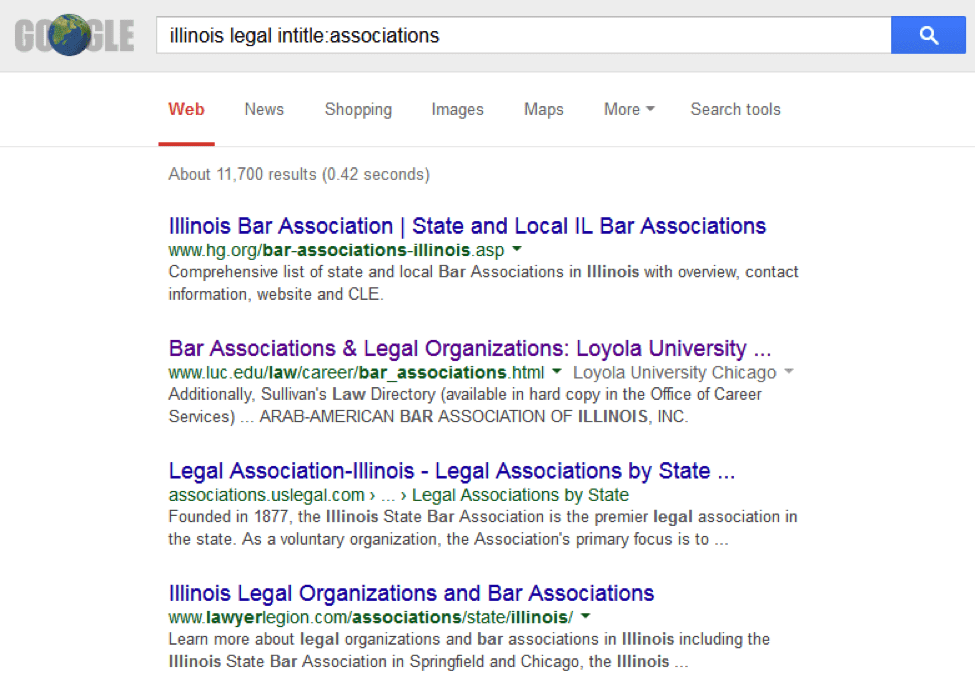
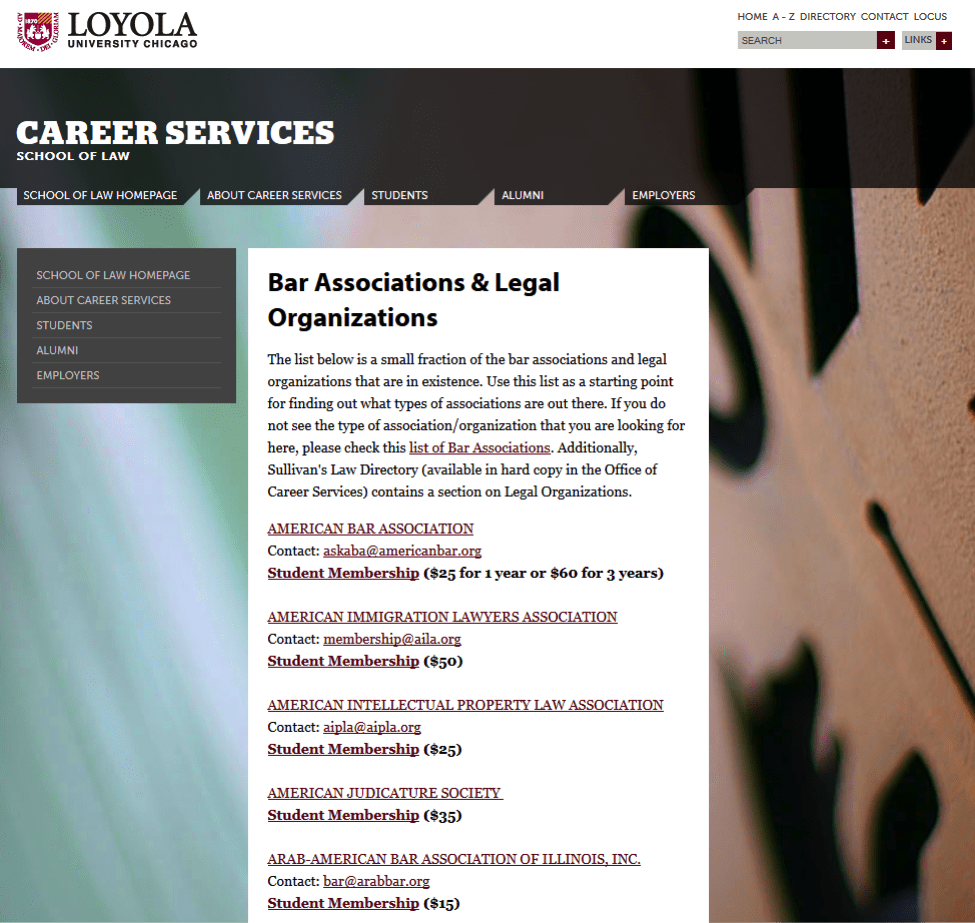
NOTE: You’ll have to check each site when researching these, as you’ll want to make sure you can actually get a link that Google can crawl. Many of these sites will put their member database behind a login that Google can’t access:
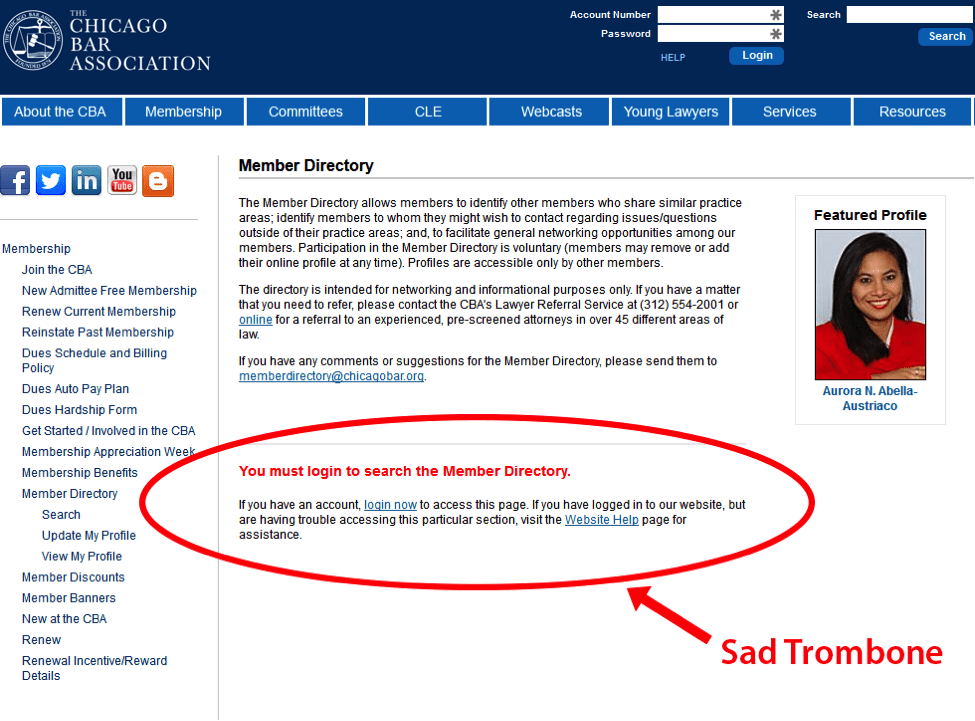
Pricing for these associations will vary greatly, so I recommend putting a list together, sorted by most valuable to least, and then discuss budget with your client or boss.
How do you determine which associations are worth joining?
Not considering possible lead generation, industry status, or other perks of membership, from a purely SEO perspective, I look at three things to determine which ones I would want to be listed on.
- Do they have a member database that offers a followed link and citation? See note above.
- Where do they rank in Google? If you found them on page 9 of Google’s search results, they might not be that important to your industry.
- What are their link metrics? Moz domain authority? How many linking root domains? Etc.
If they rank high in Google, have good looking link metrics, and you can get a followed link from their member database, you’ll want to become a member and get listed.
3) Leveraging Existing Relationships
This strategy is sure to be mentioned elsewhere in the book, but I’ve found it to be particularly fruitful for local businesses. Every business in the world works with other businesses in some capacity, and those relationships can often be turned into links. Let me give you an example:
We were working with a mortgage broker that had just started his business. I sat down with him and asked the simple question: “who do you know that would have a website that would link to you?” In 15 minutes of him scrolling through the contacts on his phone we discovered four very easy opportunities. One of them was his daughter’s real estate business. GUARANTEED LINK!
This little trick of asking the business owner to scroll through their contact list always turns up some good opportunities.
Another strategy that falls into using relationships that you already have is looking at the people and businesses that you currently do business with. Think of these as B2B links.
Consider who delivers your goods or makes a certain product that you sell. Check their website for a “Vendors” or “Partners” page. You’ll find most manufactures love to promote the companies that they do business with, so getting a link here can be as easy as picking up the phone.
If they don’t have an appropriate “Vendors” or “Partners” page, consider writing them a testimonial. Many of your business partners would be happy to receive a testimonial from you. Don’t give up if they don’t have a testimonials section on their site. Often they don’t have this section because they don’t have any testimonials. In these cases I like to write one up and suggest they add it to their homepage.
Try not to rush the prospecting phase as it helps lay the groundwork for everything else that follows in a link building campaign. Getting started is sometimes one of the most challenging aspects of finding local link opportunities.

4) Donations & Sponsorship’s
Donating Your Services
Can your business offer any services to local charities and non-profit organizations? When I first started Whitespark in 2005, I used to offer web hosting services to our web design clients. I already had the server, and adding new accounts cost me nothing, so I offered free web hosting services to a handful of local organizations in exchange for links. I had a 100% success rate in those link requests.
Think about what services your business can offer to local non-profits and start reaching out to suggest a trade for exposure. I wouldn’t request a link right out of the gates. Start with your offer, then mention your request for exposure in a follow up email. For example, for a gutter cleaning company, I’d suggest an email like this:
Subject: Can we donate free gutter cleaning to Homeless House?
“Hi there Homeless House,
I was driving by today and noticed your many gutters. We’re a gutter cleaning company in Edmonton, and I wanted to offer to donate our services, at no cost to you. We’ll come by in the spring each year to clean out your gutters.
I believe in the work Homeless House is doing and we’d like to support you with some help that could free up some of your funds or your time to be better used on some of your important work in the community.
Let me know if you’re interested. Thanks!
Jerry Maguire
President, Jerry’s Gutter Service”
Assuming you get a positive response, then you can mention your request in the next email:
“Great! We’re glad we can help.
We’re looking to promote our business online, and hope you’d be able to add a note on your sponsors page along the lines of ‘Gutter cleaning services provided by Jerry’s Gutter Service” with a link to our site for more information. This would really help us to attract more business online. Please let me know if something like this would be possible.
Thank you!”
So, think about what services you could trade for online exposure, and compile a list of organizations to reach out to. See below for how to find these organizations in your city.
Donating Your Money
If you don’t have any services to donate, you can always donate money. Every city has opportunities to sponsor a local event, association, charity, or club. Common examples include:
- Local sports teams.
- Local Meetup groups.
- Marathons, triathlons, cycling events, etc.
- Running clubs.
- Festivals.
- Art, dance, music, and theatre groups.
- Animal shelters.
- Homeless shelters.
- Food banks.
- Farmer’s markets.
- Trade shows, wedding shows, home & garden shows, etc.
- Academic events.
- Church organizations.
- Environmental organizations.
Prospecting for Sponsorship Opportunities
Here are some queries you can use to find these opportunities.
- (city) inurl:sponsors
- (city) inurl:partners
- (city) inurl:donors
- (city) inurl:sponsorship
- (city) inurl:donate
- (city) inurl:donations
- (city) intitle:sponsors
- (city) intitle:partners
- (city) intitle:donors
- (city) intitle:sponsorship
- (city) intitle:donate
- (city) intitle:donations
Run each query, then go scroll through the results looking at each page. Add any decent looking opportunities to a spreadsheet with these columns:

For only 1 credit (free trial includes a credit), you can save yourself a ton of time by running a Link Prospector query to find sponsorship opportunities in your city. Simply choose the sponsorship/donation type and enter your city as the keyword.
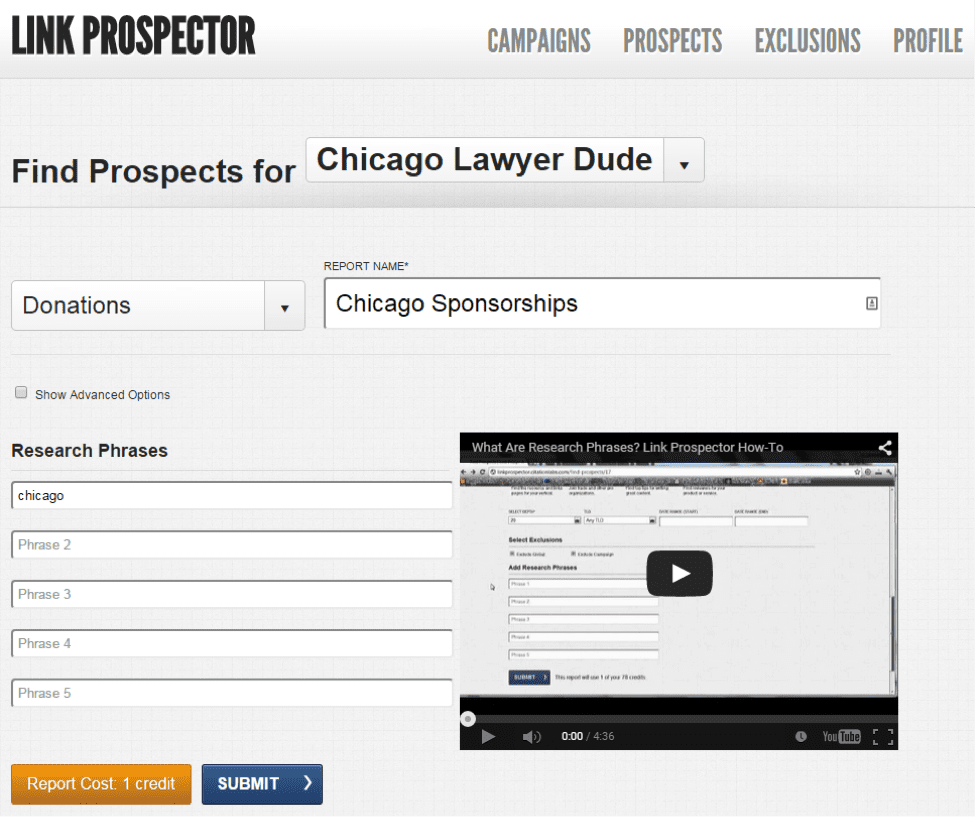
When you get your results, click the button to add Moz metrics to the report, and export it to excel. BOOM – sponsorship prospecting done. You’ll still need to work through the spreadsheet assessing the opportunities, but it sure beats slogging through search results.
Prospecting Through Competitive Analysis
Another way to find sponsorship opportunities is to check the backlinks of the businesses you see on the sponsors pages of some of these organizations. Sometimes, the business will have done extensive sponsorship link building, and their link profile can be a gold mine of opportunities. Once you find one of these gold mines, you can often stop your prospecting and just use their list.
One of my favorite examples is Lyn Lake Chiropractic. If you’re looking for marathon/triathlon related sponsorship opportunities in Minneapolis, you can’t do better than the list you’ll find in their link profile:
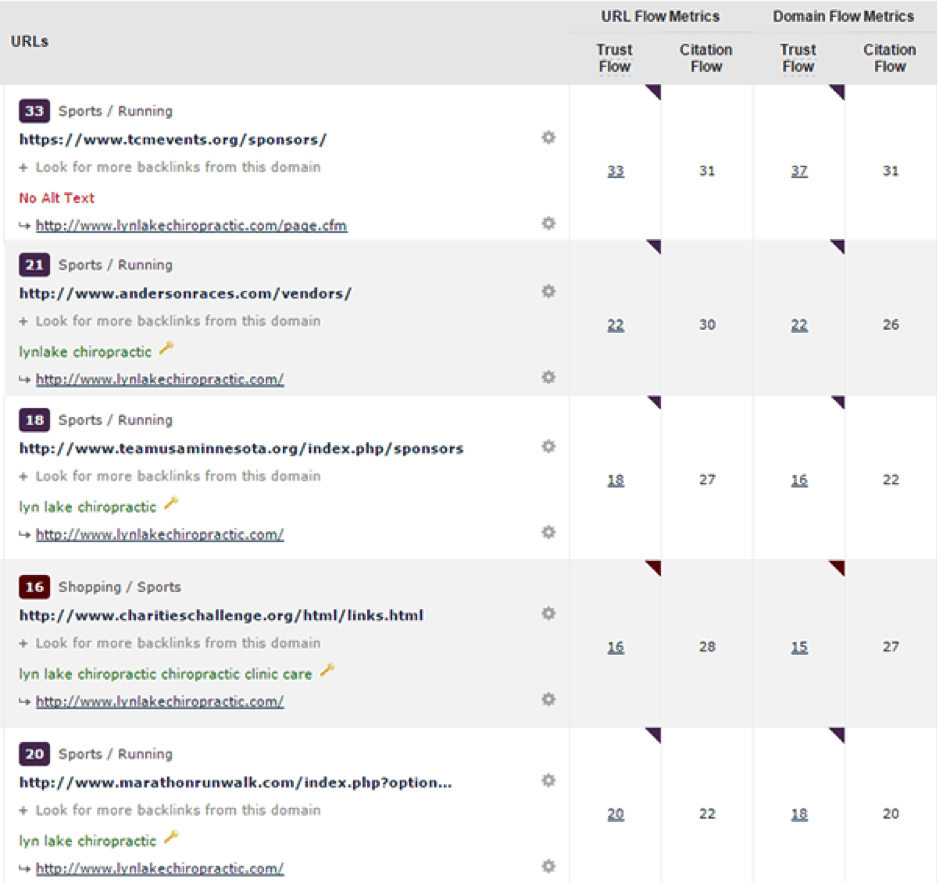
Meetup.com Sponsorship
One quick and easy sponsorship link you can get in almost any city of reasonable size is from Meetup.com. Phil Rozek wrote a great post on this topic. To find these sponsorship opportunities, run this query:
site:meetup.com “this group does not have sponsors right now” (city)
These sponsorships will get you a link but also give you brand exposure to a local audience. Ask to have your name, address, and phone number included to get the citation as well. Most Meetup groups do not have a sponsor and creating an account and reaching out to the group admin is quick and easy. Sometimes your sponsorship costs can be as simple as offering to buy pizza once a month for the meetup. Mmmm, pizza.
Don’t have the time to prospect, research, and outreach for sponsorship opportunities?
Well, then you should checkout Zipsprout, you tell them the type of local organizations you are interested in working with, your budget, and target city, and they do the work for you. They currently don’t offer their services in all US or Canadian cities, but it’s definitely worth checking out for those who are short on time and eager for sponsorship opportunities in the cities they do work in!

5) Scholarships
We have covered scholarships extensively in our post Getting Down to the Nitty-Gritty of Scholarship Link Building, so if you’re interested in all the details of building links through offering a scholarship, be sure to read that post.
One additional note to make with regards to scholarships is that over time this method of link building has become highly saturated. Many SEO’s have limited the amount of scholarship link building they are executing these days, however; when done well, and with the right intentions this can still be a rewarding strategy. Nifty Law recently did a case study on the Effectiveness of Scholarship Link Building which we also recommend you read if you are serious about implementing a scholarship.
6) Event Based Link Building
Events generally make more sense for businesses that can host guests at their office location, but service area businesses operating out of a home office can still generate links by hosting events at other locations. An additional benefit to event-based link building, is that you’ll typically get a citation (listing your name, address, and phone number) from a local site as well.
Start by brainstorming the types of events you might be able to host. Here are a few ideas:
- Restaurant – Holiday party, Halloween party, St. Patricks Day party, host a mixer, and/or host a local music artist.
- Accountant – loan workshop, debt payoff, how to use QuickBooks, how to clean up credit.
- Web/SEO – getting started with WordPress, introduction to SEO, marketing your business on Facebook.
When thinking about event topics, see if you can connect it to a major event in the city. One example that was very successful for acquiring links and mentions was a law firm that hosted a talk the evening of the gay pride parade. They brought in a lawyer from Microsoft to talk about the company’s position on diversity in the workplace and their support of same-sex marriage. They outreached to all the groups participating in the parade, and many of them listed the event on their website and promoted it on social media.
After you’ve decided on an event topic, you’ll need to create a page on your website with all of the details, some pictures, schema markup for the event, and an embedded Eventbrite form. (Note, EventBrite is free if you’re not charging for tickets.)
Once you have the page up on your website you’ll need to list it on the best major event sites and use these two simple search operators to find additional local event sites:
- (city) “submit event”
- (city) event listings
Don’t stop there though, or you’ll have poor attendance at your event. Research for local bloggers, news agencies, organizations, and businesses that might be interested in the event and reach out to them to let them know about it. For example, in Edmonton, Mack Male.
If you have a little budget, Facebook advertising works exceptionally well for events. I organized and hosted a Local University event in Edmonton, and over 40% of all the ticket sales came from Facebook advertising. Create a post with the details, then boost it to expand your reach.
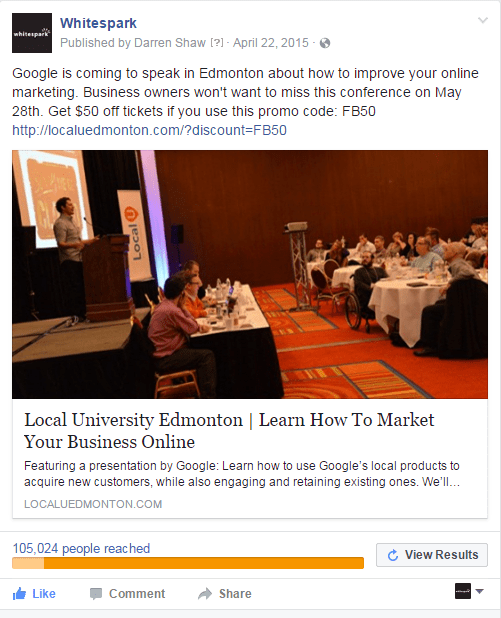
Hosting events can be a ton of work. Sure, they can generate some links, but the real reason to do them is to build local connections in your community. The people you meet and the relationships you build will be far more valuable to your business than the handful of links and citations you get from the activity. Put on good events that demonstrate your expertise and would be of interest to people in your community, and you’ll be building more than just SEO value for your business.
7) Leveraging Your Jobs Page
Does your business have any job openings? Make sure you have a jobs page on your site that you can promote for some quick local links and citations. You can submit this page to both local and national job directories. Add as much detail as possible for each position you have open. These links aren’t going to be super high quality or anything, but they are easy to get, and you can often get a boost from the local relevance.
Just like looking for event sites in your city you’ll need to use search operators to seek out local websites that offer submission of job openings, try:
- (city) job postings
- (city) job sites
- (city) job listings
- (city) job shop
- (city) job search
- (city) job bank
After you have submitted to your local and national job directories diversify your links by adding your opening to local universities if students can apply. This is tactic is especially useful for businesses that offer internships. Here’s an example of a great internship page:
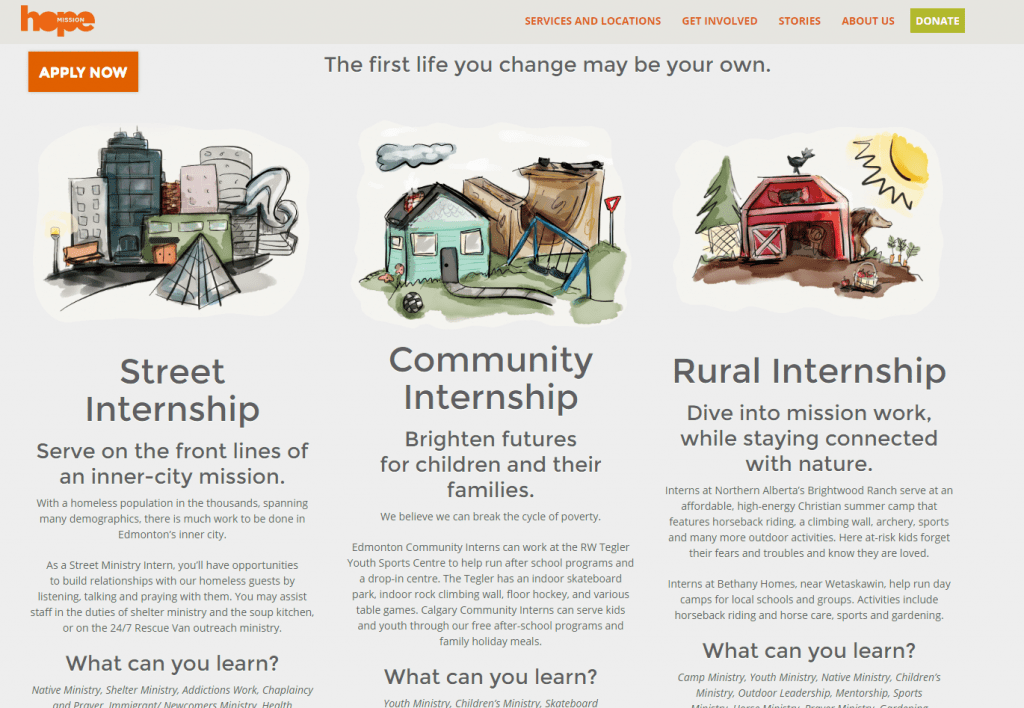
There are more tactics for building local links, but the ones listed above have been the most successful for previous clients in our LocalSpark program. Given that most small businesses have either no links or spammy links, if you invest some time into these quality link building strategies, you should see a good return on that investment.
What local link building strategies are you currently having the most success with?
Source: 7 Easy Local Link Building Tactics You Should Be Using – Whitespark


